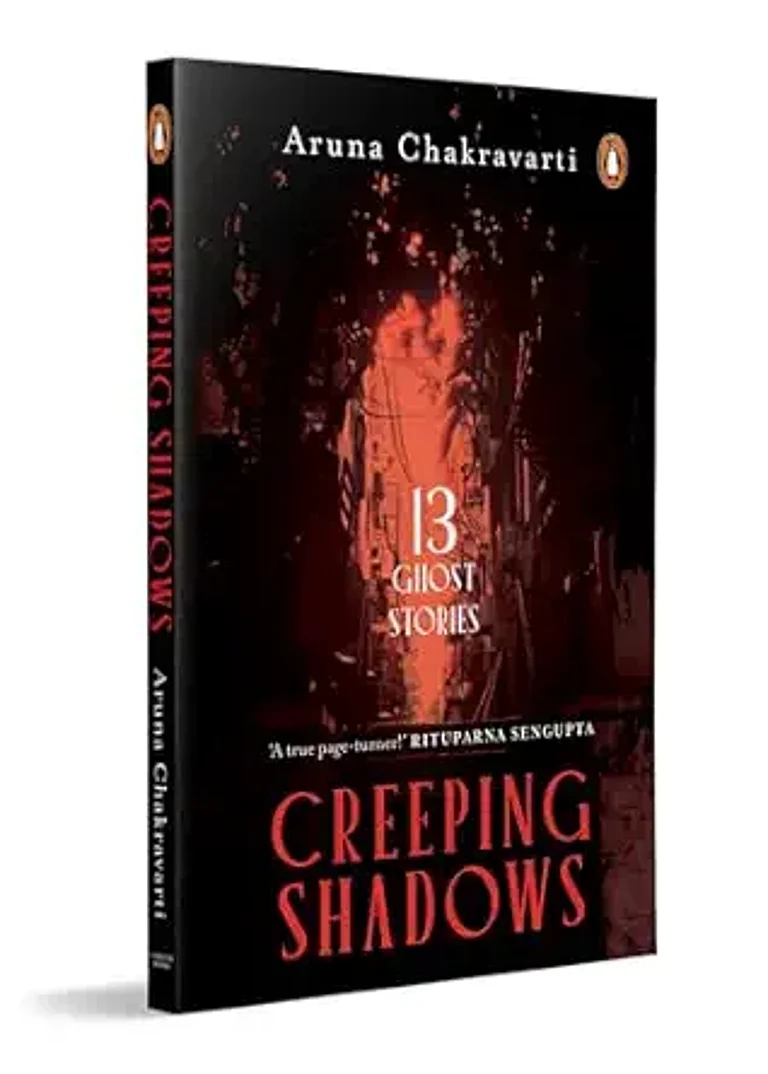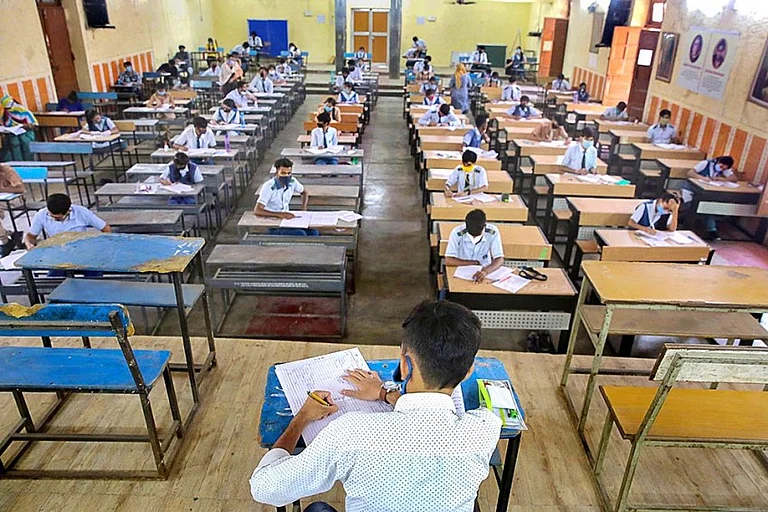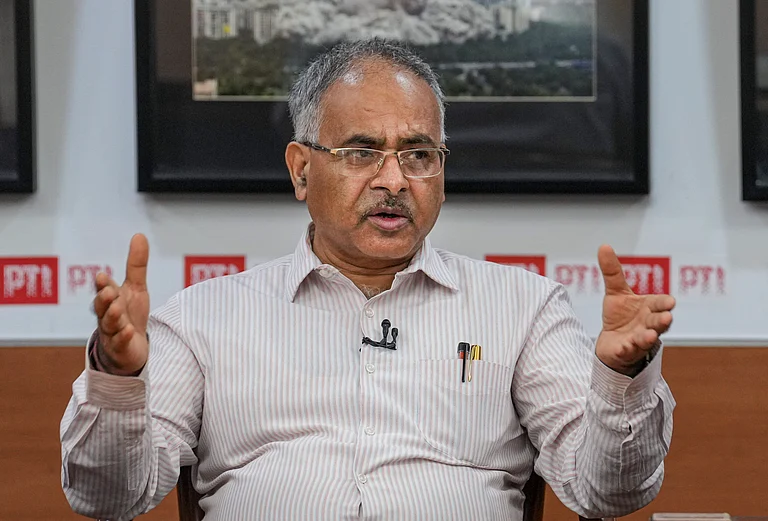Despite the relative antiquity of the theme dealing with the fabulous rise and vicissitudes of the Vijayanagar Empire culminating in its dramatic obliteration, Salman Rushdie’s Victory City is a contemporary and political work. Literature and politics mostly share an uneasy relationship. Sthendhal reminds us in The Charterhouse of Parma that “politics in a literary work is like a pistol-shot in the middle of a concert, a crude affair though one impossible to ignore. We are about to speak of very ugly matters.” Most of the themes referred to and deliberated upon in the book have been widely discussed by Rushdie in his other works and most comprehensively in Joseph Anton—a definitive account of his besieged and beleaguered days. As Rushdie reminds us in Victory City yet again, “Human intelligence and human stupidity, as well as human nature, the best and worst of it, are the great constants in the changing world.”
The quintessential question that the author seeks to discuss in Victory City is: Why does an empire collapse? And more particularly, why and how did the Vijayanagar Empire collapse as dramatically as it had risen? A threadbare understanding of the novel enables one to argue that an empire survives and thrives as long as it is receptive to new ideas, is accommodative of dissent, is amenable to alternative ways of understanding and doing things, where men are tolerant and women are empowered, where even the high and mighty are open to questioning and criticism, and it is a place without holy cows, certitudes, orthodoxies and paranoia. These are life forces that keep an empire going. When these life forces dry up, when megalomania takes over and hubris sets in, empires come tumbling down.
In the Rushdian scheme of things, in each empire, dichotomous ideas are pitted against and compete with each other for prominence. Cosmopolitanism, shared existence and the idea of a shared fate are inevitably challenged by the forces of bigotry, fanaticism and obscurantism. And there are people sitting on the fence—most unpredictable and most dangerous. Religion seeks to outgrow and overtake politics and a character like Vidyanand seeks to pigeonhole politics into narrow and exclusive confines, trying very hard to consign cosmopolitanism, and another character, Pampa Kampana champions cosmopolitanism to the dung heap of history.
In the novel, the long, acrimonious, often bloody battle between the fanatic Vidyanand and sapient Pampa Kampana is a battle in which the dice are loaded heavily against the latter. Goodness requires nurturing and pampering, cultivation and internalisation but evil sets in easily. In Shame—Rushdie’s book on Pakistan—he bemoans the lethal combination of “divine tongue and martial ears.” When fundamentalists start dictating terms to politics, the repercussions can only be disastrous.
It is probably for this reason that Rushdie uses the word ‘citizens’ and not ‘people’ for those inhabiting the Vijayanagar Empire. In the first instance, using citizens in the context of medieval India sounds incongruous. After all, the idea of citizenship is of a modern India. At a more fundamental level, Rushdie exercises his deliberation and discretion to substitute people with citizens. Citizenship is about fraternity and empathy, accommodation and reconciliation, about belief in the inevitability of a shared fate. As eminent sociologist Dipankar Gupta points out that while ‘people’ dwell on the past and are a mixture of history and mythology, citizenship is based on objectively stated principles which ensure that everybody in the state is an equal. Naturally, citizens do not come off the shelf, ready-made as people do. It requires conscious, considerable and comprehensive interventions which the fictional character of Kampana embarks upon time and again. Whether she would succeed or not is a different question.
Rushdie is extremely fond of the equation between memory and imagination. The powers that be expect people to turn their backs on memories and instead, wish people to believe in their version of memories; all the same, they want to stifle alternative imagination on the part of people. This finds echo with Milan Kundera’s argument that “the struggle of man against power is the struggle of memory against forgetting.”
Amnesia and absence of a sense of history suit those in power. People without imagination suit them even more. Rushdie does not fail to remind again and again and whenever and wherever he can that to imagine is to have power and that imagination is that realm where the long arm of the law cannot reach. Kampana—a strong woman character blessed/cursed to survive as long as the empire would survive—stands for the longevity of memories and the fecundity of imagination.
Every time Kampana’s enemies—parochialism-personified and with surfeit of viciousness—seek to undo her capaciousness, she goes into exile but without abandoning hope, not abdicating imagination while remaining invested in that balming sense of possibility that tomorrow would be better than today. At times, the basis for such optimism appears very tenuous but she still clings to fragmenting scraps of optimism with tenacity even when there is little to cling to. As Kampana writes in the last page of her book ‘Jayparajay’, “Nothing endures but nothing is meaningless either. We rise, we fall, we rise again, and again we fall. In death do triumph and failure humbly meet. We learn far less from victory than from defeat.”
For Rushdie, books and stories have always been sacrosanct. Time and again, he has voiced his opinion that if one doesn’t like a particular book, one needn’t read it but shouldn’t prevent others from reading it. Both scholar-turned-fanatic Vidyanand and the liberal Kampana write books. But the censor is after her and her book. She shouts back mutinously, “Burn all the paper you want. But every line of what I have written is held in my memory.” This reminds one of Ray Bradbury’s famous book, Fahrenheit 451—the number in the title indicating the temperature at which paper start burning. Those fleeing pyromaniacs and arsonists commit themselves to memorising books so that words would outlive tyrants and books would remain invested with a sense of eternity. In his very autobiographical Joseph Anton, Rushdie cites Mikhail Bulgakov’s The Master and Margarita to bring home the point that “manuscripts don’t burn.” And as he so aptly puts it in Imaginary Homelands—his collection of essays, “A moment of darkness will not make us blind,” meaning that even if books are burnt (and those burning books hardly ever read them), books survive as do authors. The Latin poet Ovid, who was exiled by Caesar Augustus, penned poetry that would outlast the Roman Empire. Mandelstam died in one of Stalin’s labour camps but his poetry would outlive the Soviet Union. The same goes for Lorca in Spain whose poetry has outlived tyranny.
Victory City is a tribute to the intrepidity of the ancient art of storytelling. Old Millisian storytellers would say, “Give me a penny and I will tell you a golden story.” Kampana is given to this art of storytelling. All stories could be suspect in terms of improbable details but Rushdie persuades us to see the larger picture. As he says in Joseph Anton, “to grow up steeped in the stories was to learn two unforgettable lessons: first, the stories were not true but by being untrue they could make him know and feel truths that the truth could not tell him; and second, man was the storytelling animal, the only creature on the earth to do so to understand what kind of creature it was.”
It is against this background that ‘improbables’ make sense. Kampana ages extremely slowly to survive for 247 years—as long as the Vijayanagar empire would survive before hurtling out of existence. Crows and parrots do not gather intelligence. Men and women do not metamorphose into birds and do not get back to being Homo sapiens. All foreign visitors to Vijayanagar could probably not look the same in appearance and yet it is the formidable power of storytelling that hidden meanings lurk right beneath fabulist tales. As Rushdie points out, “In the end, the salvation of human beings comes from other human beings and not from things, no matter how large and imposing—and even magical—those things might be.”
Victory City—being an essentially political venture—touches upon what has been widely debated among writers and historians of repute. Naipaul’s The Wounded Civilisation ascribes the tragic fate of Vijayanagar to the sharp and searing polarisation between the only Hindu kingdom and the united Muslim opposition acting in concert, leading to the empire’s disintegration. For Naipaul, it was a wound on the civilisation that would hobble Hinduism for very, very long, with disastrous consequences.
William Dalrymple opposes this line of argument, citing cross-cultural interactions between Vijayanagar and the Southern Sultanates and how Ahmednagar, Bijapur and Golconda had themselves been at each other’s throats and had entered into strategic alliances with Vijayanagar at different points of time against one another before choosing to join ranks against Rama Raya, his conniving ways and manipulative machinations.
Victory City concludes with, “The foundation of Vijayanagar had been its confidence and hope, and when those vanished, the illusion could not be maintained,” which should read as a warning for the reader who finds herself amidst modern-day empires fuelled on hubris and myth-making.
(This appeared in the print as "A Victory For Imagination")
Sanjay Kumar is a patna-based writer

























